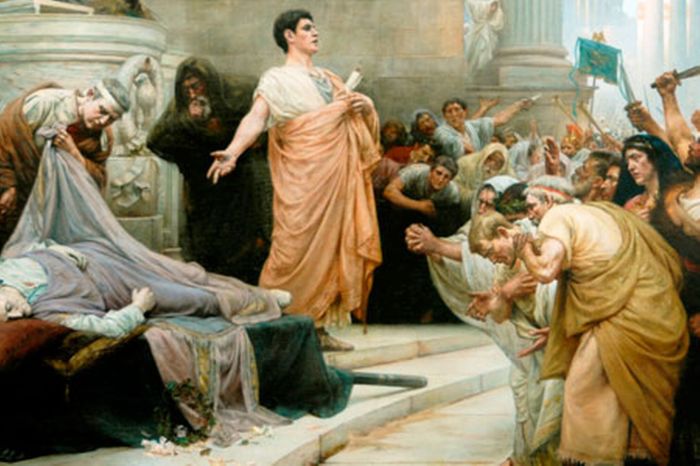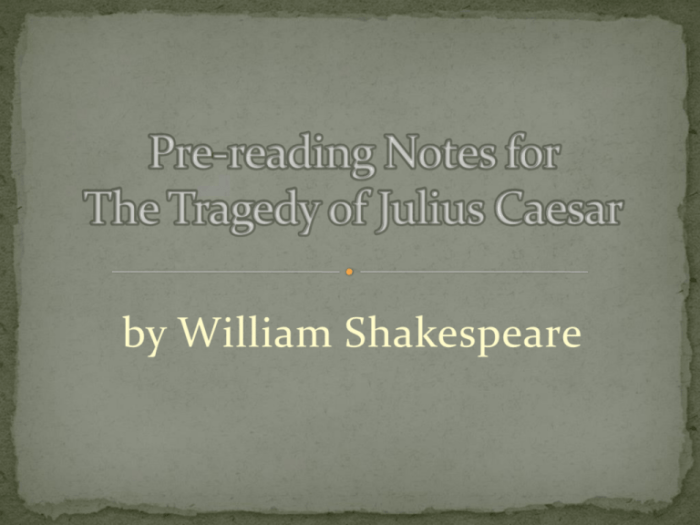Embark on an immersive literary journey with “The Tragedy of Julius Caesar Part 1: Applying Reading Strategies for Enhanced Comprehension.” This comprehensive guide unlocks the intricacies of Shakespeare’s timeless masterpiece, empowering readers with essential techniques to delve into its historical context, character dynamics, and profound themes.
Delve into the captivating world of Julius Caesar, unraveling his political aspirations and the motivations that shaped his rise to power. Analyze the intricate relationships between Brutus, Cassius, and Caesar, examining their actions and motivations as they navigate the treacherous path of political ambition and betrayal.
Background of Julius Caesar

Historical Context
The play “Julius Caesar” is set in the tumultuous final years of the Roman Republic. Julius Caesar, a brilliant general and politician, had risen to prominence through his military victories and charismatic leadership. He was a popular figure among the Roman people, who saw him as a protector against the perceived decline of the Republic.
Caesar’s Political Ambitions, The tragedy of julius caesar part 1: applying reading strategies
Caesar’s political ambitions were no secret. He aspired to become the sole ruler of Rome, believing that only he could restore order and stability to the crumbling Republic. His political opponents, led by the conservative senator Marcus Brutus and the ambitious Cassius, feared Caesar’s growing power and plotted to assassinate him.
Characters and their Roles: The Tragedy Of Julius Caesar Part 1: Applying Reading Strategies

Main Characters
- Julius Caesar:The protagonist of the play, a brilliant general and politician who aspires to become the sole ruler of Rome.
- Marcus Brutus:A noble and idealistic senator who believes Caesar’s ambition threatens the Republic.
- Cassius:An ambitious and cunning senator who manipulates Brutus into joining the conspiracy against Caesar.
Relationships and Motivations
The relationships between the characters are complex and fraught with tension. Brutus is torn between his love for Caesar and his loyalty to the Republic. Cassius, driven by envy and ambition, manipulates Brutus’s idealism to serve his own ends. Caesar, unaware of the conspiracy, remains confident in his power and popularity.
Themes and Motifs

Central Themes
- Ambition:The play explores the destructive consequences of unchecked ambition, as characters pursue power at any cost.
- Betrayal:The betrayal of Caesar by his trusted friend Brutus highlights the fragility of trust and the corrosive effects of political expediency.
- Consequences of Political Power:The play examines the moral dilemmas faced by those in positions of power, as they grapple with the balance between ambition and responsibility.
Recurring Motifs
- Omens and Prophecies:Throughout the play, omens and prophecies foreshadow the tragic events to come, creating a sense of impending doom.
- The Supernatural:The appearance of Caesar’s ghost suggests the supernatural realm’s involvement in the play’s events.
Frequently Asked Questions
What is the historical context of Julius Caesar’s life and rise to power?
Julius Caesar lived during the late Roman Republic, a period of political and social upheaval. He rose to prominence as a military commander and politician, eventually becoming dictator of Rome.
How do the characters’ interactions contribute to the tragic events?
The complex relationships and motivations of the characters, particularly Brutus, Cassius, and Caesar, create a web of intrigue and conflict that ultimately leads to Caesar’s assassination and the downfall of the Roman Republic.
What are some of the central themes explored in the play?
The play explores universal themes such as ambition, betrayal, the consequences of political power, and the struggle between public duty and personal loyalty.
How does Shakespeare’s use of language enhance the play’s impact?
Shakespeare’s skillful use of rhetorical devices, imagery, and symbolism creates a vivid and emotionally resonant experience for the reader, intensifying the play’s dramatic tension and emotional impact.
What is the significance of the play’s structure and plot?
The play’s five-act structure and carefully crafted plot build suspense and foreshadow the tragic events, creating a sense of inevitability and catharsis for the reader.